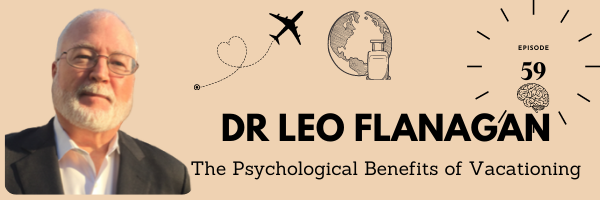
Today is a bit of a different episode.
We’re going to talk about the importance of taking a vacation.
Yes, taking vacations is not just for having fun once a year. They’re also there for your health. Now, they’re only good for your health if you properly prepare yourself beforehand.
In this episode, I have Dr. Leo Flanagan, psychologist and trauma expert, and he is going to tell us exactly why vacations are so important, how we can transform our vacations to get the most health benefits from our time off, and why we need to be more conscious of our work-life balance.
Let’s go:
[02:36] Who is Dr. Flanagan?
Dr. Leo Flanagan has been a psychologist for 35 years, he was a Cornell faculty member for 11 years, he’s worked as a clinician, hospital administrator, a senior executive member of Merryll Lynch, Wills Holdings, and The Forum Corporation.
He started his firm, The Center for Resilience, after being a responder to Hurricane Sandy, the Sandy Hook shooting, and the EF-5 tornado.
“The people who have been through disasters aren’t sick from something innate, it’s because of the experience we’ve had, so labeling them is not really helpful.”
During the pandemic, he’s been working to help people train their brains to become more resilient.
[05:04] Prescribing vacations.
Since the start of the pandemic, the percentage of the US population that meets the criteria for anxiety and depression has risen to 40%. That’s a staggering 5x more than before the pandemic.
In the past year and a half, people have been isolated, constantly in a state of fight-or-flight, and not having proper time off. We have become so hyper-aroused due to all the threats around us, causing massive amounts of bottled-up stress and anger.
It’s best to go on vacation and not think about work or be hyper-aroused by all the stressors of the pandemic, and you can achieve true relaxation and stress relief by practicing resilience before taking that much-needed time off.
“Vacation is not prescribed by the neuroscience, but it’s prescribed by common sense.”
[07:27] Prepare your mental state for vacation.
If you have a vacation coming up, you probably shouldn’t just leave work and go on vacation. You won’t enjoy it, you’ll be stressed about work, and you’ll constantly think about everything except having a good time at your vacations destination.
There are a few things that you can do.
First, you need to become focused. You can do this by meditating – you only need 20 minutes to do breathing meditation once a day, and you can also do 3-minute meditations 3 times a day.
Secondly, you need to get your phone out of your room. The average person checks their phone 155 times a day. If you have your phone with you on a vacation, leave it in the safe. You don’t want to constantly be reminded about work by checking your phone every few minutes “just in case”. If you need to check in on work, make sure you do it at specific times and for a limited time during the day – an hour a day is too long, so keep it way below that.
The idea is to be present while you’re on vacation.
[16:46] How long before vacation should you start mental preparations?
It takes, on average, 60 days to re-wire the brain toward resilience.
That doesn’t mean that you should wait 60 days before you go on vacation.
If you’re going on vacation tomorrow, you can prepare yourself mentally by downloading a good breathing app and start meditating today. You can even meditate on the plane en route to your destination. If you’re going to be spending hours in the plane, you might as well take a few minutes to work toward your own resilience.
Put on your headphones, close your eyes, and become mentally isolated from the rest of the plane. This will significantly decrease your stress levels.
[18:31] Getting yourself ready on the plane.
When you look at your itinerary, you’re more likely to get stressed out.
Things can go wrong, delays are common, and those things can interrupt your vacation readiness.
Envisioning your trip, where you’re going, and each stop you’ll take, will allow your mind to handle any changes to that isn’t in a rigid itinerary.
Remember that not everyone is calm and kind all the time. If you deal with someone who isn’t at their kindest, remember that this is a time of high uncertainty, and perhaps you would’ve been equally stressed or agitated in their position.
Empathy shuts down your ability to be angry. Be empathetic to others, but also, more importantly, be empathetic towards yourself. When you’re empathetic towards others, you’re also much more likely to receive a positive response.
Practice optimism. There are those moments when things go wrong, and it can take some time to recover from those emotions. Practicing optimism is simple – when something goes wrong, get into the habit of telling yourself that it will pass.
[24:41] Vacation healing.
If you’ve taken a vacation after having a terrible experience, as we all have in the last year and a half, you’re going to be more productive, more sociable, and your cognitive abilities will be improved.
In order for this healing to happen, you need to take a real vacation – no checking your phone every few minutes, no thinking about work, and no distractions outside of the vacation that you’re having. Not taking this time off could, in fact, have a negative effect.
[26:51] Why people don’t take their vacations.
People who get given vacation time but choose to avoid going on vacation tend to have a fear of things happening while they’re gone, missing opportunities and they’re often so immersed in their work that they simply don’t make the time to go on a vacation.
The healthy thing to do is to take that vacation time and unplug from work.
[28:10] Mini vacations based on stress levels.
4 out of 10 people meeet the criteria for clinical anxiety and depression. Chances are pretty good that you have some stress.
A sign of burnout is when you become cynical (assuming this isn’t normal for you). Once the cynicism starts, it’s safe to assume you need to take a mini vacation. In fact, even if you’re not burnt out yet, you can still reap the benefits of a mini vacation.
Pandemic-induced mental issues are all reversible.
Take those mini vacations for your mental health – either you do that or you take your money and see a therapist.
Stress doesn’t only affect your mental health. It suppresses your immune system, meaning that you’re more likely to fall ill.
[32:13] Vacation doesn’t have to be big.
Get rid of this idea that a vacation has to be an extravagant international trip.
Taking a vacation can be as simple and inexpensive as being a tourist in your own hometown. Head to the beach, go on a hike, go camping – anything that can get you away from work and stress is better than nothing.
[34:37] Respect the time off.
Sometimes on vacation, you’ll get a text or an email from people who want your attention at work.
The solution is simple. Set your email to “out of office” and don’t check your work communications until you’re back on the clock.
Working during your time off isn’t healthy – I’m looking at you “Type A” personalities. The actual phrase is “Type A personality, the coronary-prone individual” – you have a much higher chance of having a coronary. Take that time off.
If there’s an emergency, no one is going to email emergency services. If your work-related issue can be sent in an email, it can wait until Monday. When work ends on a Friday, that’s when work ends – you should consciously decide to leave your work at the door when you leave the office.
[43:01] These are great opportunities for change.
The number one challenge listed by Human Resources executives is employee mental health.
The pandemic has given us a golden opportunity to destigmatise mental health – having more people talking openly about their trauma-induced mental health experiences will assist those with chronic mental illnesses to express their challenges without the stigma.
Vacations are also a fantastic way to open the conversations around diversity, equity, and inclusion. Traveling to other parts of the world, where the cultures and people are different to your hometown or country, you’re exposing yourself to a wide spectrum of views, opinions, and customs.
[44:30] Slow, meaningful travel.
Taking a vacation can mean different things to different people.
It’s important to take the time to have a vacation that is meaningful to you, but also to realise that there are opportunities beyond the scope of your specific vacation.
If you’re at a resort, head out into the city and experience local life. Get to know the locals, immerse yourself in the culture, and ultimately take the opportunity to grow as a person.
Travel can change people’s lives.
If you have the opportunity to take a vacation, you should take it.
Dr Flanagan dropped some big gems in this episode.
Be kind to others, be kind to yourself, and, most importantly, get out there and experience the world. It will help you manage your stress, it will improve your physical and mental health, and it will change your life the more you do it.
If you want to connect with Dr. Leo Flanagan, visit the links below:
Website: https://www.centerforresilience.com
Twitter: https://twitter.com/LeoFFlanagan
Facebook: https://www.linkedin.com/in/dr-leo-f-flanagan-jr
Get the book: Thriving in Thin Air
Rate, Review, & Subscribe on Apple Podcasts
If you enjoyed my show, please inspire others to listen, as well. You can do this by rating my show and giving me a review on Apple Podcast. Don’t forget to SUBSCRIBE! You do not want to miss out on new episodes. SUBSCRIBE NOW!
Check out the links to some of the things mentioned in this episode:
- The Erica James Travel Show Podcast Community
- Check out my travel tips, tricks, and reviews on YouTube
- Erica James Travel Agency Facebook Page
- Follow EJtheTravelDiva on Instagram
- Follow EJtheTravelDiva on Twitter
- If you would like to support the podcast you can do so here
- Check out my pins on Pinterest
- Link up with me on Linkedin
- Listen to my previous podcasts here.
- Read my travel blog here.

